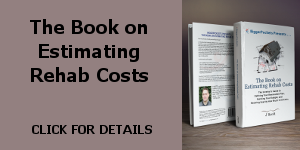We closed on the purchase of The Neighbor House yesterday…
While it took about a month past the original closing date, everything went pretty smoothly. I was planning on closing this one with a loan, but the title company pulled a short version of the title, and my lender wouldn’t finance the property without the long-form title search (they didn’t want to find problems down the road).
Long-story short, I ended up closing with my own cash, and my lender agreed to refinance the property with their own attorney and title company this week.
Also, if you recall, I was looking to wholesale this deal to another investor because of the deed restriction imposed by Fannie Mae (the seller). Basically, the restriction says that I’m not allowed to sell this property for at least 3 months if the sale price is over 20% above my purchase price.
Well, it looks like the closing attorney forgot to add the restriction onto the deed, so from the perspective of whoever handles my sale, they won’t know that there is any restrictions. That said, while I could probably get away with selling this property whenever I want and for however much I want, I do run the risk of Fannie Mae coming back and enforcing the restriction later (if they ever figured it out).
So, I probably won’t take the risk of selling it for too much, too soon, and am still looking to wholesale it to another investor…




Might be worth fixing it and reselling it? If they didn’t put a restriction on the deed it’s going to be tough for Fannie Mae to track it down.
Any luck finding apartments or commercial stuff?
Steve –
It’s certainly tempting…though I still have this nagging feeling that if I try to do it, it will come back to bite me one way or the other…
I may consult my attorney to figure out what the worst-case scenario/penalty would be if I got caught, and make my decision from there…
I just found found your blog. I spent about an hour reading through all your old post. What a great blog! I am going begin investing in real estate in the near future. This site will be a great tool. Thanks!
-Brian
*going to begin
You mentioned using your own cash…I have often wondered what kind of nest egg you had from your previous life when you started. Have you ever worked with a self directed IRA? Or do you know anything about them you can share??
thanks
Don
Don, you will want to think long and hard about using your retirement IRA for real estate investing. I would start with the banks first, then perhaps doing a joint venture with someone. A good JV partner could also be your contractor.
Hi Don –
We actually run two separate investing companies. The first is funded by our personal savings, plus we have a line of credit from a small, local bank that finances many of our properties. Between the line of credit and the cash we have invested, we have access to enough funds to hold/rehab about 6 houses simultaneously. (Btw, this is why I highly recommend working with local banks)
Additionally, we own a separate corporation that is similar to a self-directed IRA (SDI), but actually much more flexible. It is funded by portions of my wife and my retirement funds, and allows us to operate a full-fledged investing company using the money. Unlike an SDI, where you can’t materially participate in the investment, the operating company that we have REQUIRES us to be involved in the company’s operations on a day-to-day basis. Additionally, unlike an SDI (or most other retirement vehicles), our company allows us — actually, it requires us — to draw a salary from our profits. There are some downsides — such as the fact that this retirement vehicle must be structured as a C-Corporation and therefore is taxed sub-optimally — but overall, I find it much more suitable to operating a full-time investment business than an SDI would.
If you want more info, shoot me an email…
Good Morning Jason,
I’ve been following you, steph, steve (flippinghomes.com) toms blog for about a year now. I’m 30 and working for the state dept in Afgan as a helicopter crew chief. My savings has hit 200k and i plan on doing about 18 more months, i want to pull out at 400k and start my rehab biz. I’m very hands on and will prob be my own G.C. My original plan was to have about 2 rehabs going on at a time, and use my own cash to buy and rehab. I live in Kansas City, i have a quad and live in one of the units. I was just going to i guess just take 1000.00 a week out of my savings and live on this. Then I read this comment about your corp. Am I going about this the wrong way? Do i need to set it up as a corp and actually write myself a check once a week? I just liked the simplicity of taking 1000.00 a week out of my savings to live on and just paying my short term capital gains taxes on my rehabs at the end of the year. I don’t have a corporate background like you and am not real business savvy so this is the one area I struggle in. In direction you could point me in would be a great help. Thanks for all that you do.
Hey Josh,
First, congrats on being in the position you’re in! Sounds like you’re going to be well-prepared for RE by the time you start investing full-time.
As for your question, it’s somewhat complicated, but I’ll try to explain it as simply as possible. At the most basic level, it’s not absolutely necessary that you have a corporation. You can do everything without a corporate entity, take money out of your savings each week, etc. But, there are some things you need to consider:
First, even if you don’t have a company, from the IRS perspective, you’re still self-employed and will still owe a couple different taxes on the money you earn. You’ll owe income tax on everything you earn (just like if you were getting a salary from a job) and you’ll also most-likely owe self-employment taxes on everything you earn, even if you just stick the money in savings and don’t “pay yourself.” Because all the work you do yourself is considered business income, you will be treated like a company from the IRS, even if you don’t set up a company.
Now, given that, perhaps you’ll want to set up a company. Doing so may provide you two very big advantages:
1. Liability protection. If someone who is working with/for you gets hurt, or if someone decides to sue you for whatever reason, having a corporate entity that your assets are under will provide you some protection in case you lose a lawsuit. There are lots of different ways to structure a business to protect your assets, but virtually all of them are better than not having a business structure at all.
2. Tax advantages. That self-employment tax I was talking about can be as much as 15% of your income! There are ways to avoid at least some of this tax using corporate structures. Depending on what you’re doing specifically, there may be ways to avoid all the self-employment tax. But, without a corporate entity, you can’t avoid these taxes.
So, in general, while you could probably avoid setting up a company, I’m not sure you’d want to. Yup, there’s some extra work involved in setting it up, managing it, paying taxes, etc. But, you’re going to be doing a lot of this whether you formally set up a company or not, and setting one up will provide a lot of benefits.
Not to mention, you can get people to help you with all of this (set up, legal advice, tax/payroll, etc) for a small fee. It’s well worth it in my opinion.
Just some stuff to think about! Let me know if you have any more questions…